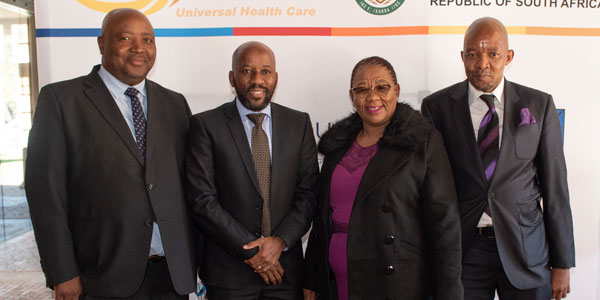Department of Health and academia partner to advance public health
- Wits University
A consortium of universities with health sciences faculties has won a Department of Health tender to contract healthcare professionals.
In a closed bid, the Department of Health invited universities to tender for contracting healthcare professionals in nine provinces over three years. This test of contracting mechanisms aims to support National Health Insurance (NHI) reforms and advance universal health care.
Launched at the University of the Free State in Bloemfontein on Thursday, 6 June 2019, the Universities Consortium (UC) comprises the University of the Witwatersrand, Sefako Makgatho Health Sciences University, University of Fort Hare, University of Pretoria, Nelson Mandela University, and the University of the Free State.
The Faculty of Health Sciences at Wits University leads the Universities Consortium, which contracted the Wits Health Consortium (Pty) Ltd (WHC) as project manager.
“We are excited about this venture, which will contribute to a cultural change in universities and to societal reform,” said Dan Mosia, Chief Commercial Officer at WHC and head of the Project Management Unit.

A translation of political will
MC, Dr Edith Madela-Mntla from the University of Pretoria said that the UC launch indicates the translation of political will to action the biggest implementation challenge of the NHI. “The Free State was chosen [for the launch] because it is in harmony with how the NHI should work.”
Prof. Nathaniel Mofolo, Head of the School of Clinical Medicine, Faculty of Health Sciences, University of the Free State welcomed guests. He said that the UC, and other South African universities with health sciences faculties invited to the launch, “Bring our best brains together to make the NHI work.” He alluded to the auspicious date – the sixth day of the sixth month as South Africa enters the sixth dispensation of her democracy – and the partnership with the national and provincial Departments of Health. “Together we can achieve more,” he said.
A plan to place unemployed health sciences graduates
In an an overview of the UC and bid, Prof. Pinky Seekoe, Dean of the Faculty of Health Sciences at the University of Fort Hare explained that the National Department of Health (NDOH) had identified the need to collaborate with universities to strengthen health systems. The goals of the UC are to develop service delivery models, optimise the placement of health care professionals, test and implement a contracting mechanism, and service vulnerable populations, amongst others. A high-level project plan over three years will place unemployed graduates, said Seekoe, and the six UC institutions will cover all nine provinces (although allocation of institutions to Limpopo and Mpumalanga provinces is still under discussion).
A self-professed “foot soldier for 25 years”, Dr Steven Matshidza said he “cannot wait for NHI to work effectively”. Matshidza represented the South African Medical Association at the UC launch, which the National Health and Allied Workers’ Union and the Congress of South African Trade Unions was also invited to attend. “Involve us!” said Matshidza. “This is my plea to the Consortium. We want it to work. You cannot do it alone.”
The role of universities in public health
Prof. Francis Petersen, the Vice Chancellor and Rector of the University of the Free State reflected on the role of universities in society – to train professionals; conduct research with impact; and close the potential divide in the appropriate dissemination of new knowledge.
“Universities in this [UC] case must play an active role in understanding health challenges,” he said. There is a bias towards private, urban, hospital care in the health sector and the NHI is about addressing those that this misses, said Petersen, adding that universities should provide new knowledge and be innovative.
“How can we make a model that works, with a focus on service delivery that brings the best care to our patients?” said Petersen. This requires the involvement of the communities and of the provincial and national Departments of Health – “This is a group of universities that illustrate what the heart of collaboration is,” said Petersen.
Departments of Health changing the ballgame
Dr David Motau, HOD of Health in the Free State referred to the province’s high maternal mortality rate – amongst the highest in the country. He said that the UC was necessary for the Free State because the province has “an eagerness to achieve greatness” and “a willing MEC” in Ms Montseng Margaret Ts’lu.

A former nurse and NEHAWU leader, MEC Ts’lu said she is passionate about the NHI and welcomed the commitment from universities in the consortium. The NHI should benefit those on the periphery, she said, not just those in urban areas or with money. “The Universities Consortium gives us hope. As a pilot, a co-pilot, and a crew, we are ready to move in a positive direction and change the ballgame of our country.”
Prof. Lungile Pepeta, Executive Dean, Faculty of Health Sciences at Nelson Mandela University reiterated the theme of collaboration in service to society that had emerged at the UC launch. “This is a benchmark event for this Consortium,” he said.

